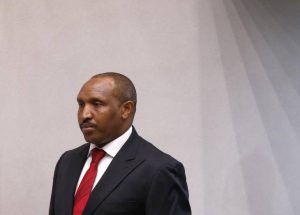 His fate already known since Monday, July 8, 2019. ICC declared Mr. Bosco Ntaganda guilty of 18 counts of war crimes and crimes against humanity, committed in Ituri, Democratic Republic of Congo (DRC), in 2002-2003.
His fate already known since Monday, July 8, 2019. ICC declared Mr. Bosco Ntaganda guilty of 18 counts of war crimes and crimes against humanity, committed in Ituri, Democratic Republic of Congo (DRC), in 2002-2003.
Congolese rebel leader Bosco Ntaganda “Terminator,” was a key leader who gave the order to “target and kill civilians” in the unstable mineral-rich region of the Democratic Republic of Congo in 2002 and 2003, the ICC said.
The atrocities include a massacre in a village where children and babies were eviscerated or had their heads smashed, the judge said.
Ntaganda is also responsible for rape and sexual slavery of underage girls, the recruitment of troops under the age of 15 and the murder of a Catholic priest, again according to the ICC judgment.
Ntaganda “occupied a very important military function, he was one of the main leaders” of the rebel group, said judges, adding that “Mr. Ntaganda’s skills were highly respected”.
he Chamber notes that it reviewed all the evidence presented during the trial, including documents, eyewitnesses and privileged witnesses, before making its decision.
In its judgment, the ICC Trial Chamber states that it has found that “the Union of Congolese Patriots (UPC) and its military wing, the Patriotic Forces for the Liberation of Congo (FPLC), have been involved at all times in at least one non-international armed conflict against an opposing party, in Ituri, district of the DRC, from or before August 6, 2002 to December 31, 2003 “.
The conduct of the UPC / FPLC against the civilian population was, according to the ICC, the expected result of a preconceived strategy targeting the civilian population. “The crimes were committed in accordance with a UPC / FPLC policy. Mr. Ntaganda exercised a very important military function within the UPC / FPLC “remarks the ICC.
Reason for which, the judgment points out, “Trial Chamber VI found Mr. Ntaganda guilty of crimes against humanity (murder and attempted murder, rape, sexual slavery, persecution, forcible transfer of population and deportation) and war crimes (murder and attempted murder, intentionally directing attacks against the civilian population, rape, sexual slavery, ordering the displacement of the civilian population, recruiting and conscripting children under 15 years of age and their use to actively participate in hostilities, attacks on protected property, and destruction of property belonging to the opponent).”
According to human rights groups, more than 60,000 people have been killed since the violence erupted in the region in 1999, as militias fight over the control of scarce mineral resources.
The Chamber concluded that “Mr. Ntaganda was directly responsible for part of three of the counts of crime, namely murder as a crime against humanity, war crime and persecution as a crime against humanity, and that he was responsible for indirect author of the remaining parts of these crimes. He was found guilty as an indirect perpetrator of the other crimes “.
There remains the determination of Mr. Ntaganda’s sentence in this case. The Chamber says it will first receive submissions from parties and participants regarding the possible sentence, and will hold a separate hearing to gather evidence and address sentencing issues. Pending the decision on sentencing, Mr. Ntaganda will remain in detention.
The parties (the Prosecution and the Defense) have 30 days to appeal this judgment. Reparations issues for victims will be considered in due course, the judgment concludes.
Mr. Ntaganda’s trial opened on September 2, 2015 and had 248 hearings. During the trials, Ntaganda told the judges at his trial that he was “not a criminal but a soldier” and that the nickname “Terminator” was not attributed to him.
The ICC heard from 80 witnesses and experts called by the Office of the Prosecutor of the Court, Ms. Fatou Bensouda, 19 witnesses called to the bar by the Defense team headed by Lawyer Stéphane Bourgon, and three witnesses that the representatives of the victims involved in the proceedings summoned, as well as five victims who presented their views and concerns.
A total of 2,129 victims, represented by the legal representatives of the Office of Public Counsel for Victims, Ms. Sarah Pellet and Mr. Dmytro Suprun, participate in the trial with permission of the House.
A former Congolese army general, Ntaganda later became a founding member of the M23 rebel group, which was finally defeated by Congolese government forces in 2013.
The first suspect to have voluntarily surrendered to the ICC, he visited the United States Embassy in Kigali, the capital of Rwanda, in 2013, and asked to be sent to the Court, based in the Netherlands.
Ntaganda is one of five Congolese warlords brought before the ICC, set up in 2002 as an independent international body to prosecute those accused of the worst crimes in the world.
Former Ntaganda FPLC commander Thomas Lubanga was sentenced to 14 years in prison in 2012.
